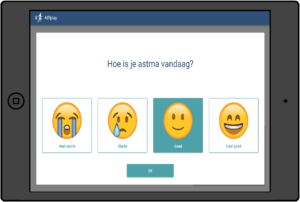AIRplay was developed specially for children with asthma. The personal gamified app helps them monitoring and dealing with their illness. The app is combined with an interactive playground with games. The games can be projected onto playgrounds or in waiting rooms. In this way, children are encouraged to get moving, which is important for asthma patients. In the game, children are stimulated to play together, and learn more about dealing with their illness.
The concept comes from Dr Boony Thio and Monique Tabak and was initially funded by the Pioneers in Health Care Innovation Fund. This fund of multiple partners stimulates cooperation between medical specialists and researchers in order to achieve new insights and technology with a view to improving the efficiency of patient care. Thio’s study on self-management in young asthma patients through serious gaming won a voucher from the fund, which financed the development of AIRplay.

Thio recommends that we should try to identify with our target group. Children grow up with modern technology; their iPads and mobile phones are their source of information. You therefore have to adapt the way you deal with children to fit in with their world and their interests. You also have to ask yourself again and again how you can stimulate, challenge and activate children, how you can get them to take their medication, be cooperative, and so on.
The developers are currently about to implement the game further and in a wider context. The focus will lie on the one hand on research and optimisation for use in the current and long term, and on the other hand on potentially expanding the target group to include patients with conditions such as diabetes or other health disorders.
People often want to keep things the way they are, because it has worked well for so long, or simply because that’s what they have learned. But our society is changing rapidly, and healthcare will also have to change in order to remain successful. The best method according to Thio is to continually try things out and see what works. He recommends that we continue to watch and listen well to patients and, perhaps most importantly, to be open to change.

